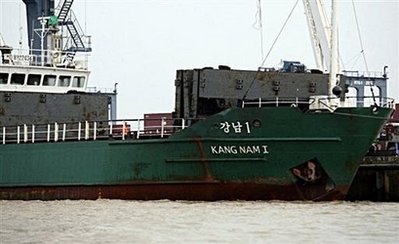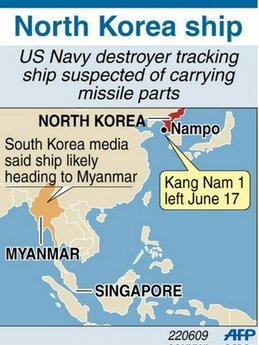A 2,000-ton North Korean cargo ship will dock at Thilawa port, 30 kilometers (20 miles) south of Rangoon, in the next few days, an official at Thilawa port authority told The Irrawaddy on Monday.
The Kang Nam 1 left a North Korean port on Wednesday and passed along the coast of China. A US Navy destroyer has tracked the ship since its departure.
 |
| The Kang Nam I cargo ship docks at Rangoon in 2007. A North Korean ship is suspected of ferrying banned weapons cargo in violation of a UN Security Council resolution. The US military has beefed up defenses in Hawaii over fears that North Korea could launch a missile toward the Pacific island chain. (Photo: AFP) |
The same ship docked at the port in 2004, at that time raising suspicions about the nature of its cargo. Speculation centered on convention arms, missiles or some type of nuclear weaponry.
“Normally, North Korea cargo ships dock in Thilawa port,” the port official told The Irrawaddy.
The Burmese military government permitted a North Korean cargo ship, the Kang Nam 1, to dock in 2007 near Thilawa port because it reportedly was in distress and taking shelter from a storm. The docking raised suspicions about its cargo.
The government said that it allowed the Kang Nam to dock for humanitarian reasons. The true purpose of its visit might have had something to do with Burma’s goal of being a nuclear power by 2025, according to some military analysts.
In the past, there have been rumors circulating inside and outside Burma that North Korean nuclear technology specialists were in Burma, offering the junta nuclear and biological technology.
 |
| Map showing locations relevant to the North Korean vessel Kang Nam I, which left the port of Nampo last week and is reportedly heading to Burma with a suspected consignment of missile parts, according to South Korean media. (Graphic: AFP) |
Military analysts say the North Korean Communist regime has provided Burma with weapons, military technology transfers and expertise in underground tunneling used for concealing military installations.
North Korea sold rocket launchers to Burma in 2008, in a deal that was brokered by an unnamed Singapore trading country in violation of the UN sanctions imposed against North Korea after it conducted nuclear tests in 2006.
Burmese-North Korean military ties were reestablished in 1999 when members of the Burmese junta paid a low-profile visit to the rogue state. The junta sent a delegation to North Korea secretly again in November 2000 for a meeting with high-ranking officials of North Korea’s People’s Armed Forces. A North Korean delegation led by Deputy Foreign Minister Park Kil-yon met with his counterpart, Khin Maung Win, in June 2001.
Burma and North Korea, two of Asia's most authoritarian countries, officially restored diplomatic ties in 2007, ending a diplomatic crisis after a bombing carried out by North Korean spies in 1983, part of an assassination attempt on South Korea's then-president, Chun Doo-hwan, during a visit to Rangoon.
North Korea has consistently angered its Asian neighbors and other countries with threats of missile launches, threats against South Korea and its on-gain, off-again nuclear program, prompting US and South Korean forces to raise their military alert status recently.


